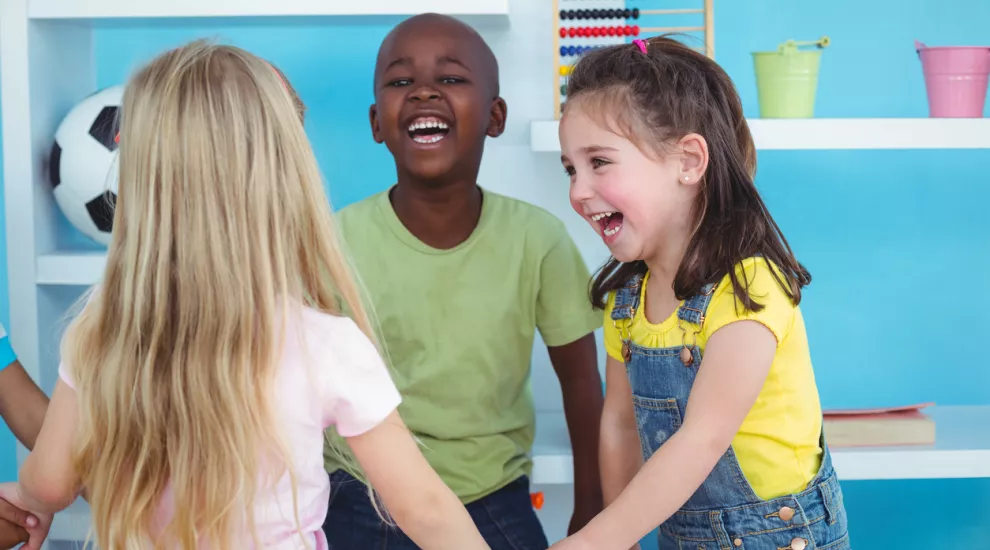
From our Educator Guest Blogger Series
“Social Emotional Learning is defined as the process through which children and adults understand and manage emotions, set and achieve positive goals, feel and show empathy for others, establish and maintain positive relationships, and make responsible decisions." (Collaborative for Academic, Social and Emotional Learning, 2019) The foundation of positive Social Emotional Learning is relationships -- relationships with the students we teach and the parents and colleagues we interact with daily.
The million-dollar question is …How are we as teachers supporting and teaching positive social and emotional interaction among our students? Are we modeling positive interactions, are we supporting children as they try to manage their emotions and show empathy for others, or are we just hoping it all works out for the best? In recent years, we have seen an influx of children entering our schools in Pre-K and kindergarten with challenging behaviors. How can social emotional learning impact challenging behaviors?
Change in Perspective? Promotion and Prevention
How do we change the perspective? We must be advocates for the children and parents we serve as educators. As teachers, we must encourage students, parents and colleagues to foster and build meaningful relationships. Additionally, we must provide and promote strategies that will allow students, parents and teachers to process their emotions positively. According to the Center on the Social and Emotional Foundations for Early Learning, “… early childhood care and education programs that include family support can be effective in the promotion of infant mental health and prevention of IMH challenges". With all the developmental challenges toddlers have (separation anxiety, autonomy issues, management of their emotions, peer conflict, etc), being mindful of these challenges can assist the teacher, parent and student in weathering an emotional storm.
How Focus is the Focused Intervention
Most teachers are well aware of the economic, environmental and social factors that can trigger challenging behaviors in students. Many of these triggers can be eased by a change in strategy and intention, a process known to educators as Focused Intervention. “Focused Intervention is an intentional process by which the educator prevents the occurrence or escalation of mental health problems and minimizes children’s social emotional developmental risk.” (Center on the Social and Emotional Foundations for Early Learning, n.d.) One of the key words in Focused Intervention is minimizing; we want to minimize the occurrences of escalations in our classrooms. How do we do that? We do it by building and fostering positive relationships with students, parents and colleagues. We must model, support, promote, and encourage meaningful relationships. This is KEY to minimizing occurrence of challenging behavior and essential to preventing future occurrences.
Tips for working through feelings:
- Talking aloud so that your students can hear the self-talk in your head and learn how to maneuver through the process of weathering the emotional storms.
Here are a few things I have found myself saying:
- I am feeling a little frustrated. I am going to take a walk around the block because fresh air and exercise always help me feel good inside.
- I am tired right now and that makes it harder to be patient. Do you ever get upset when you feel tired? I think I will go to bed a little earlier tonight.
- Looks like everyone is a little upset. Maybe we need a snack. Sometimes a healthy snack helps me feel better.
- When I was driving in the snowstorm, I was nervous. I started breathing fast — just like you do when you are upset! So I did some belly breathing to help me stay calm.
- Become more mindful how you respond to daily stressors and how you can respond with a little more courage, patience and self-compassion.
- Acknowledge your students' feelings.
- Remain calm.
- Reflect on the encounter with your student.
- Let your students know you will be there for them. (Lerner, L.C.S.W.-C, 2018)
To learn more about Social Emotional Learning and Development, please visit the following sites:
- PBS Parents Website
- The Collaborative for Academic, Social, and Emotional Learning
- The Center on the Social and Emotional Foundations for Early Learning
Bio
Kimberly Singletary received her Master’s in Education Technology from Webster University and her Bachelor’s in Early Childhood Education from the University of South Carolina. She has extensive experience integrating technology with instruction and conducting professional development. Kimberly was an educator at R.E. Davis Elementary School in the Sumter School District for 5 ½ years and was named Campus Teacher of the Year in 2016-17. Kimberly is currently the Early Learning Wi-Fi Manager at SCETV were she manages the Educational Broadband Wi-Fi Access Project and provides professional development training to Pre-K-12 teachers across the state of South Carolina.
Note: This guest blog does not necessarily reflect the views of ETV Education.

